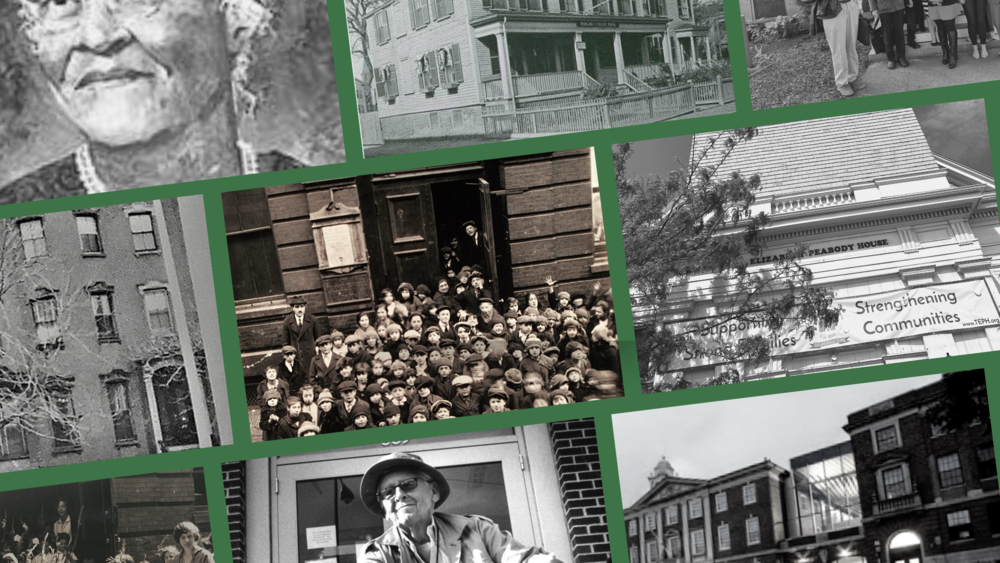For over 40 years Food For Free has bridged the gap between waste and want, becoming a critical piece of our local history working to end hunger in our community.

Food For Free Food Rescue Coordinator Erica Kenny unloads rescued food at the Elizabeth Peabody House, 2020.
Food For Free is proud to be a part of an unstoppable hunger-relief network in Greater Boston. For Women’s History Month and International Women’s Day, Food For Free highlights local partner organizations in Cambridge and Somerville and historic hotspots in Boston representing women in the fight to end hunger:
1. Margaret Fuller Neighborhood House – Cherry Street, Cambridge
“Built in 1807 as the childhood home of Sarah Margaret Fuller, a noted author, feminist, and Transcendentalist, our house on Cherry Street was reinvented in 1902 as one of the first Settlement Houses in the United States.
At the time, it was the height of the industrial revolution in Cambridge. Factories were staffed mostly by recent immigrants, and their living conditions, in boarding and tenement houses, were dire. In keeping with the spirit of the Settlement House movement, Margaret Fuller Neighborhood House (MFNH) was designed as an outpost of education and culture for these workers, and to ease class tensions.
Young women working 12 hour days came to the house for lunch. Volunteers and staff held meetings and socials; supplied food and clothing for women; organized day and rest trips for mothers; and helped women to find employment.
In the ’40s, the house hosted a boxing ring, and in the ’50s and 60s, teens from all over Cambridge came to Friday evening sock hops. In the early 70s, the Black Panthers had a radio station on the third floor and sponsored Saturday morning father and son breakfasts in the basement.
The Margaret Fuller House was designated a National Historic Landmark in 1984. Today, the Margaret Fuller Neighborhood House food services program provides emergency food to over 7,000 families each year.”
2. The Elizabeth Peabody House – Broadway, Somerville
“The Elizabeth Peabody House was founded as a settlement house serving the diverse immigrant community in Boston’s West End in 1896.
Offering arts, education, and health programming, the organization was named in honor of Elizabeth Palmer Peabody, a Bostonian who was a Kindergarten trailblazer in America, a noted intellectual in the Transcendentalist movement, an author and publisher, and an advocate for women’s rights, antislavery policies and indigenous rights.
During the redevelopment of the West End in the 1950s, Elizabeth Peabody House followed much of the community up the road to Somerville and has been a fixture on Broadway in the former Broadway Methodist Church building in the decades since.
Today, as a modern nonprofit with historic roots, Elizabeth Peabody House offers families in Somerville and surrounding communities preschool, afterschool, summer camp, and a food pantry.”
The final three spots are from the Boston Women’s Heritage Trail as part of The Food Advocacy Trail, a thematic trail that focuses on the inequality of food access in Boston. Through their work as advocates, the women recognized have provided food for those in need and serve as an inspiration for hunger relief organizations today.
3. North Bennet Street School – 150 North Street in the North End, Boston
“To meet the immigrant community’s needs in the North End, the North End Industrial Home, later, North Bennet Street Industrial School, was opened in 1881. The institution provided a blend of social work and education and a haven for women and children. Pauline Agassiz Shaw (1841-1917), one of the founders of the North End Industrial Home, also introduced kindergarten classes and Boston’s first day nurseries with the North Bennet Street Industrial School.
Settlement houses allowed immigrant people to better their lives through vocational training, recreation activities, childhood education, and necessary resources. Zelda Brown, who joined the organization in the early 1900s, facilitated more formalized social service resources, including housing and food services assistance.
Located here today, the North Bennet Street School, renamed in 1983, has full-time craftsmanship training, including bookbinding, cabinet and furniture making, and carpentry.”
4. Kip Tiernan – Old South Church at 645 Boylston Street, Boston
“Kip Tiernan (1926-2011) dedicated over 30 years to the fight against hunger in Boston. Between the early 1970s and 1990s, she co-founded over 15 different shelters in the city, including one of the first female-only shelters in the country, Rosie’s Place, in 1974. Kip Tiernan was compassionate to homeless people in the city and provided a comfortable and beautiful place to encourage rehabilitation. Rosie’s Place provides women a place to sleep and eat, where there is always a beautiful and safe space for them, with a rose, of course!
Located on the sidewalk outside Old South Church, The Kip Tiernan Memorial includes quotes from speeches she made over the course of her life. The Memorial was installed in October 2018, a few years after her death in 2011.”
5. Women’s Service Club – 264 Massachusetts Avenue, Boston
“The Women’s Service Club (1918-present) began as a knitting club, organized by Mary Evans Wilson (1866-1928), to meet the needs of Black servicemen in and from Boston during World War I. Their efforts expanded to support the needs of the Black community who suffered extensively from the racist circumstances of the era.
The Women’s Service Club was part meetinghouse part settlement house in the mid-twentieth century. They provided the essential service of a haven for Black persons, for both new or long-time residents of the city. In addition, food and other essential items and vocational training were accessible through the Women’s Service Club.
During the Civil Rights Era, African American Women could find housing with the Women’s Service Club when denied access to the dormitories in the universities. The rise in these racial inequalities transitioned the club to a critical hub for the Black Rights Movement. Melnea Cass (1896-1978) became president during this period, supporting the rights of Black women as domestic workers through legislation and a homemakers program.”
The full trail can be toured in-person and online. For full details, including trails that highlight women in public dining and food education visit: Women Feeding Boston Tour. ❂
Sources:
- https://bwht.org/women-feeding-boston-tour
- https://www.rosiesplace.org/who-we-are/our-history/kip-tierna
- https://www.margaretfullerhouse.org/our-histor
- https://www.nbss.edu/blog/detail/~post/be-part-of-our-rich-histor
- https://www.nps.gov/articles/000/women-s-service-club-of-boston.ht
- https://www.teph.org/







